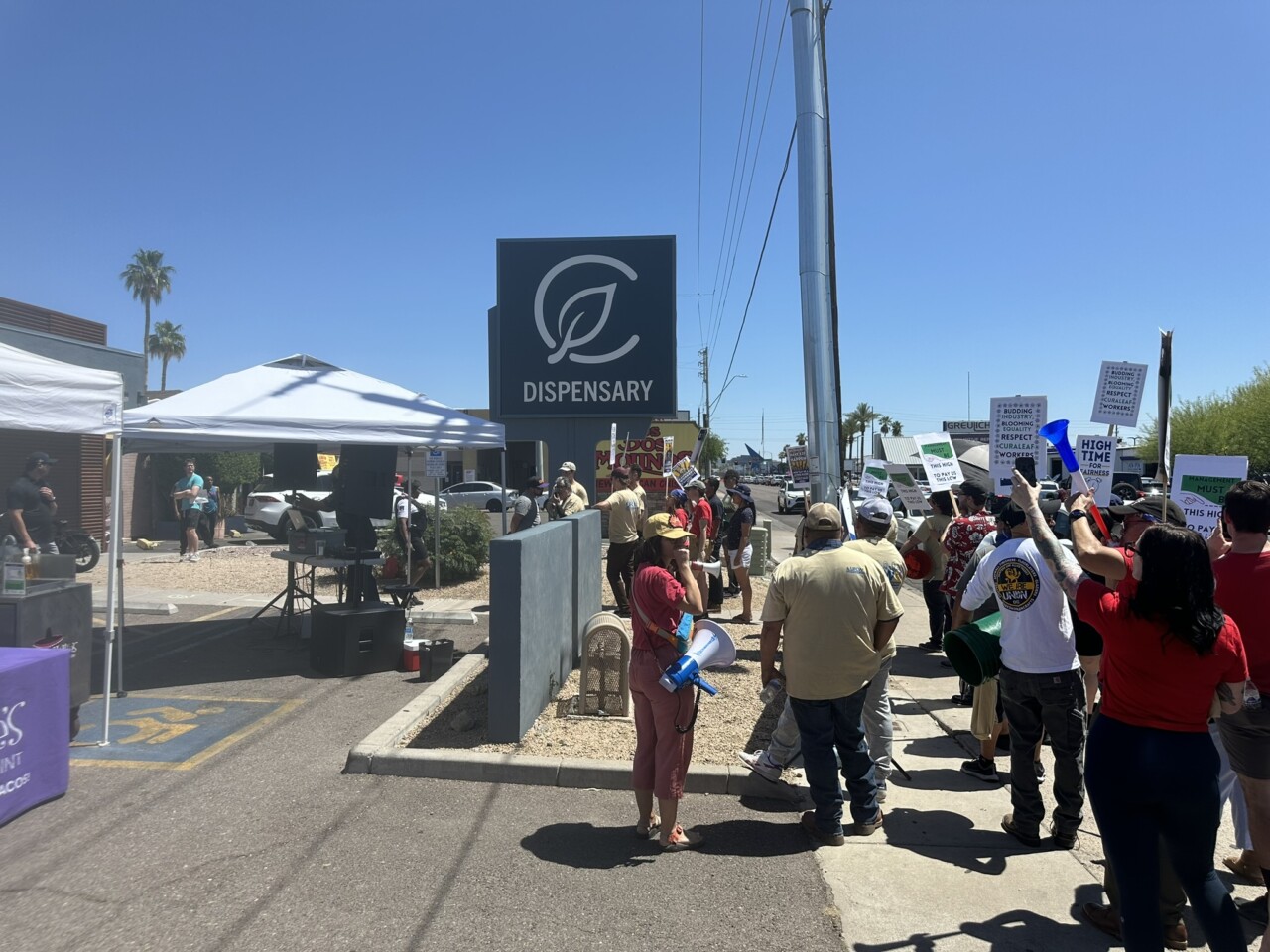Scottsdale, AZ–Despite Prop 205’s heartbreaking loss on election day and more threats on the horizon, leaders in Arizona’s medical marijuana industry were in high spirits last week when the group convened for their monthly meeting in Scottsdale. [read more]
The event took place Wednesday, Nov. 30th, at the lavish Saguaro Hotel. Over 200 people were on hand for an event that focused on an election post-mortem and strategies for an anticipated all-out attack on AZ Cannabis businesses. The only state of 9 that failed to pass its marijuana initiative in 2016, AZ’s Prop205 cannabis initiative cost the industry millions and lost by less than 3% of the vote. Prosecutors like Maricopa County’s notorious Bill Montgomery led the prohibitionist charge and, in the wake of 205’s failure, have already called to shut down the entire state’s medical program.
And that’s only one of the many challenges the industry expects to face in 2017. Since day one, right-wing prohibitionist legislators have annually attacked Arizona’s medical program. So far the industry had successfully staved off every bad bill, but that was before the 205 defeat and the looming specter of Jeff Sessions as US Attorney General.
Luckily, AZ’s five-year-old cannabis industry, which struggled to find a unified face or consistent message, appears to be coming together under the leadership of AZ’s fledgling Marijuana Industry Trade Association, the brainchild of industry insider, Demitri Downing. A former tribal prosecutor and lobbyist, Downing was one of the organizers behind the shaping of 205 and created the state’s premiere cannabis event, the annual Southwest Cannabis Conference and Expo.
“Every other successful industry has trade organizations and a legislative agenda, so it was a no-brainer that somebody needed to create one for AZ,” Downing laughs. After several attempts at industry organizing by others failed, Downing’s MITA finally came together mid- 2016, initially as a fundraising group supporting 205, and has grown to become the go-to event for industry smoozing and strategy sessions over alcohol and appetizers.
“From the beginning, this was the campaign’s to lose”
That night however, the crab cakes couldn’t compete with the heavy-hitters on the MITA meeting line-up, which included lobbyists, legislators and lawyers, and featured election analysis by the state’s leading marijuana writer Ray Stern, of PHX New Times. “From the beginning this was the campaign’s to lose,” Stern noted pointedly during the panel discussion that included, Downing, principle 205 author and counsel, Ryan Hurley, cannabis family law attorney, Sonia Martinez and dispensary owner, Jim Kauffman.
“Like many in the state I was worried from the beginning,” Stern acknowledged. “The initiative was always behind in the polls. In 2010 Prop203 [the AZ MMJ initiative] was polling at 58% and we only won by 4100 votes. When this thing was going into the final weekend with only 51% polling, we were right to worry and indeed it lost by 3%.”
After a bitter race that set friend versus friend, fractured the movement and wound-up costing more than $3 million dollars to lose, the final tally wound up being YES 1,233,323 to NO 1,300,344, or less than 70,000 votes out of over two and a half million cast. Stern noted that the bill’s very specificity left it open to attack. “It was so long there was too much ammo for the opposition, and this [campaign’s] approach did nothing to battle back the charges against it.”
In specific, Stern took aim at 205 campaign chair and front man, JP Holyoak, who ruled the campaign with an iron fist. “For whatever strengths he brought with money and organization, JP was a weak front man; and when the opposition campaigned that the initiative was a corporate takeover of the marijuana industry, his was not the face to challenge the attack.” AZ’s leading cannabis attorney, Ryan Hurley also complained of the choices of the conservative consulting company that shaped the messaging on the campaign. “They claimed their connections on the right would help us. They did not,” Hurley said bluntly.
“The lies were off the chart on this one”
Having analyzed the campaign and the movement in dozens of articles over the past two years, Stern commented at length about the scope and scale of the official No-on-205 campaign led by state’s prosecuting attorneys association leader, Sheila Polk and her “non-profit” MATFORCE, even if truthfulness wasn’t a part of their campaign. “The lies were off the chart on this one. Aside from California, more money was spent by the anties in Arizona than in all the other battleground states combined,” Stern added. Over 4 and a half million was raised in opposition to 205 and a significant portion of that came from the efforts of Arizona Governor Doug Ducey.
In contrast, Hurley, agreed with most of Stern’s assessments, but broached a sore spot for the industry, the fact that vast numbers of AZ’s marijuana smoking community actively worked against 205. “I have to admit the Safer/AZFMR crowd cost us 15 to 20,000 votes.” In an election with only 67,000 votes, the difference of having 20,000 voters switch from yes to no and actively campaign against 205 proved fatal.
The riff was a long time in building, dating back to 2010 and flaws in the Arizona Medical Marijuana Act itself and the MPP campaign behind it. When the 205 negotiations began in the fall of 2014, the initiative was promised to be collaboration between the national experts, MPP (the Marijuana Policy Project), the AZ dispensary association, and the activist community, represented by grassroots PAC, Safer Arizona.
The arrangement quickly broke down during the actual writing of 205 and epically collapsed in early 2015, when MPP and the industry temporarily both developed separate initiatives. The activist community rejected both MPP and the dispensary industry efforts and launched their own 3rd initiative, known as the AZFMR (Arizonans for Mindful Regulation), in a move many contend was a mortal blow to the movement. Eventually MPP and AZ’s cannabiz community, came to a compromise that excluded many of the concerns of the activists.
The state’s leading activist organization at the time, Safer Arizona disbanded with executive director, Mikel Weisser, standing behind Prop 205 and leaving the group to helm the state chapter of NORML. Safer Arizona founder, Dave Wisniewski, re-organized his followers as a social media attack force and the more aggressive elements of the community rallying against MPP’s initiative at every turn.
Initially, some 205 supporters fled the group to briefly join AZ-NORML, but faced relentless meeting disruptions and non-stop online trolling by AZFMR followers, NORML’s operations were crippled. Safer AZ joined forces with the AZFMR, created a massive disinformation campaign and became a powerful public presence across the state, and even larger online force pushing against legalization. AZFMR campaign manager, Jason Medar, had previously led the successful fight against California’s Prop 19 and used many of the same guerilla tactics to keep MPP and their supporters at bay. The group was supported by many players in the state’s underground economy and was widely rumored to have been funded by a group of California’s underground growers, known as the “collective.” At one point, AZFMR claimed to have collected over 100,000 signatures in their bid to stop MPP.
“We probably should have compromised”
Opposition from both the left and the right capitalized on what Stern termed the “monopoly/greed” factor. No-on-205 proponents from both sides challenged details of the proposed regulatory structure, which would have created a marijuana cabinet level department and installed 3 dispensary industry owners into the 7-member board that would have governed the industry. The opposition coined the term ‘Oligopoly’ and neither the industry nor the 205 campaign adequately challenged the claim, even if it wasn’t exactly true.
In retrospect, Hurley admits that there were provisions that could have been modified to garner more support for the bill. “I now think that limiting the retail licenses as strictly as we did probably wasn’t the best idea. It was certainly used against us. Also, our language regarding DUI left the opposition wiggle room. I appreciate our intentions, but we probably should have compromised on that to protect ourselves from their attacks.”
AZ House Democratic Legislative Counsel, Jennifer Harris was on hand and agreed. “Language is so incredibly important. I am familiar with the actual passage the opposition ran with and it can be construed to have prevented prosecutors from getting convictions.”
Hurley called for the industry to form itself fully and develop a lobbying presence at the state capitol. “We have to play defense now. You can bet we are going to be faced with a rackful of idiotic crap,”
The remaining speakers hammered the point home. John Hartsell, longtime legislative activist and reporter for Weediabuzz, insists that the climate at the state capitol is going to stay toxic for the time being and the state’s only reasonable hope for legalization must come from the ballot process. Hurley however cautioned the gathering to not get swept up in the underground movement’s supposed 2018 initiative movement. “We will get it the second time around. California did. But it won’t be 2018. Without MPP or a presidential race to mobilize the voters, we will have to wait till 2020.”
Finishing up, Hartsell urged the industry to be sure they keep “their voice in the room” at the state house, a sentiment echoed by top legislative staffer, Harris, and longtime cannabis reformer, State Representative Mark Cardenas (LD19). Cardenas, who has introduced pro-cannabis legislation in each of the past three sessions, warned about the importance of the industry keeping a close eye on next year’s legislative agenda and being prepared to fend off an expected slate of anti-cannabis bills by an empowered right wing.
In the run-up to the election the Arizona Democratic Party and Democratic state legislators rallied behind the industry and the legalization movement. Recently numerous state legislators even began showing up at industry events. At the October MITA meeting, Democratic House leader, Ken Clark, led a contingent of pro-cannabis legislators that pledged to protect the industry against anticipated Republican attack. Demitri Downing, called the Democrats, “the industry’s firewall.”
MITA will soon get a chance to test that firewall. Bills are already being filed at the state legislature ahead of the upcoming session that opens Jan. 9th. Before leaving the podium, Ryan Hurley once more challenged the room to rise-up and prepare for the upcoming legislative session, “Expect attacks to the medical program. We have to get back up and get ready to fight, we have no other choice.”






Leave A Comment
You must be logged in to post a comment.